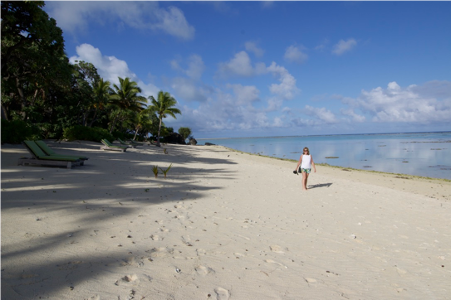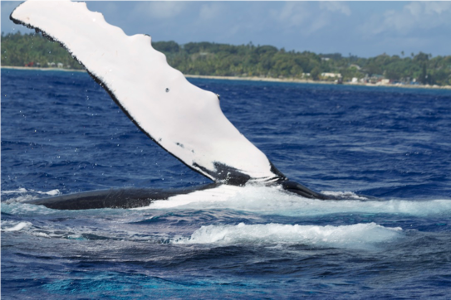Members Slot
Scott Burridge - A Life Changing Experience
 As I sit at The Islander Hotel, a few minutes walk from the Airport in Rarotonga, killing time before our flight back home, the ocean is close. Incredibly, humpback whales can be seen breaching beyond the reef just out from the hotel bar. I feel close to nature and quite awed by it.
As I sit at The Islander Hotel, a few minutes walk from the Airport in Rarotonga, killing time before our flight back home, the ocean is close. Incredibly, humpback whales can be seen breaching beyond the reef just out from the hotel bar. I feel close to nature and quite awed by it.Yesterday I experienced one of the most awesome things in my life – swimming with whales. I got within touching distance of a mother and her calf. It beggars belief, that these beautiful creatures were hunted, in the case of some species, almost to extinction. During our holiday we’ve had other wonderful experiences, such as snorkelling in the Aitutaki Lagoon to see giant clams, watching a school of giant trevally and a large Napoleon Wrasse pass by, swimming with turtles and a “fever” of Eagle Rays (a good quiz question?).

Being amazed by these things, it is easy to forget how interlinked and fragile it all is. The Cook Islands seems to be currently experiencing a shortage of fish; some say as a result of overfishing and others as a result of unseasonably bad weather and the potential effects of climate change. Either way there is a direct impact on the locals and, very likely, on the marine food chain. There are also controversial proposals being considered by the Cook Islands government to allow mining of polymetallic nodules from the seafloor to extract valuable rare metals for sale on the global market. It seems to be accepted that the mining would likely have devastating impacts on some of the surrounding coral reefs. Consequences from such things may have irreversible effects beyond these beautiful islands.
My holiday reading included a thought-provoking book by David Attenborough A Life on Our Planet: My Witness Statement and a Vision for the Future, published in 2020. I recommend this book for anyone who may be curious about the impact of humans on the natural world. It’s an easy read. His central theme is that to avoid catastrophic events from occurring over the next century, some of which are already happening, we need to protect biodiversity and make changes to allow its regeneration. In his lifetime, the wilderness on earth has decreased by almost 50%, and with it a huge loss in biodiversity, while the world’s population has increased more than threefold. Biodiversity has been, and continues to be, lost through the destruction of forests for beef production or palm oil, the acidification of oceans from rising temperatures and increasing CO2 levels, and the pollution of waterways from fertiliser runoff. He infers some simple things that individuals can do to encourage the rewilding of the planet.
Eat less meat, particularly red meat. Beef is a very inefficient source of protein, requiring 15 times more land per kg than pork or chicken. In David Attenborough’s words, “It is simply not going to be possible to eat the amount of beef now consumed by people in the wealthiest nations today. We don’t have enough land on Earth to do so.”
Be a more thoughtful and critical consumer. For example, I will in future try to enquire how that fish I purchase was harvested. New technologies are being developed to allow for more “sustainable fishing”. It may mean the price is higher but surely the protection of our marine diversity is worth a premium.
Debbie and I are committing ourselves to make these and other changes in our lives. One of my reasons for this that I want to have the chance to swim with the whales again, and for my children and their children to also share in that awesome experience.
